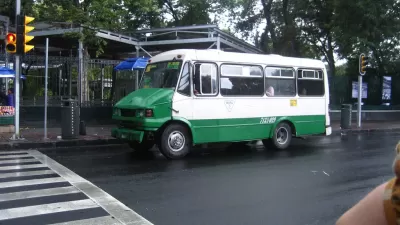Uber-style public transit gets people in urban and rural communities where they need to go in ways fixed-route buses can’t. But do the numbers pencil out?

On-demand, point-to-point ride programs in Missouri cities are receiving mixed reviews, reports Meg Cunningham of the Kansas City Beacon. This type of publicly funded service, also known as microtransit, has been touted as an alternative to fixed bus routes in Kansas City and St. Louis and a way to improve mobility in smaller cities and towns without public transportation.
Microtransit was initially launched in Missouri in response to declining bus ridership, exacerbated by the pandemic. Transit agencies cut routes and frequency, which resulted in even fewer riders. But people still need to get where they’re going, and within their budgets.
Funded by a combination of tax dollars and grants, public microtransit services hire private drivers in a similar fashion to ride-share services like Uber and Lyft. The original vision was to extend the reach of public transportation—for example, by connecting suburban riders to the nearest bus line—or providing affordable rides in service zones without frequent bus service.
While demand for microtransit is high and increasing, some locales are finding it’s not as cost-effective or efficient as a fixed-route bus system, Cunningham reports. “Kansas City’s microtransit program, IRIS, launched in March. On average, it costs the city about $29 a trip. Kansas City is seeing much of its demand for microtransit come from those traveling into the city from the Northland or Martin City. For the KCATA system as a whole, the cost per passenger in October was $1.88.”
As Missouri’s microtransit experiment continues, officials and advocates are still hopeful it can become a cost-effective way to meet a growing need, particularly in rural areas.
“Missouri has to think creatively about how to connect rural and urban communities,” Tyler Means, the chief mobility and strategy officer at the KCATA, told the Kansas City Beacon. Rural communities “are going to shrink and age, and they’re going to need more services in areas that have just kind of been forgotten about,” he said. “So they need solutions like this to allow them to gain access to the resources they need.”
FULL STORY: Missouri cities and rural towns look at Uber-style rides to replace buses. But can they?

Maui's Vacation Rental Debate Turns Ugly
Verbal attacks, misinformation campaigns and fistfights plague a high-stakes debate to convert thousands of vacation rentals into long-term housing.

Planetizen Federal Action Tracker
A weekly monitor of how Trump’s orders and actions are impacting planners and planning in America.

In Urban Planning, AI Prompting Could be the New Design Thinking
Creativity has long been key to great urban design. What if we see AI as our new creative partner?

Florida Seniors Face Rising Homelessness Risk
High housing costs are pushing more seniors, many of them on a fixed income, into homelessness.

Massachusetts Budget Helps Close MBTA Budget Gap
The budget signed by Gov. Maura Healey includes $470 million in MBTA funding for the next fiscal year.

Milwaukee Launches Vision Zero Plan
Seven years after the city signed its Complete Streets Policy, the city is doubling down on its efforts to eliminate traffic deaths.
Urban Design for Planners 1: Software Tools
This six-course series explores essential urban design concepts using open source software and equips planners with the tools they need to participate fully in the urban design process.
Planning for Universal Design
Learn the tools for implementing Universal Design in planning regulations.
Gallatin County Department of Planning & Community Development
Heyer Gruel & Associates PA
JM Goldson LLC
City of Camden Redevelopment Agency
City of Astoria
Transportation Research & Education Center (TREC) at Portland State University
Jefferson Parish Government
Camden Redevelopment Agency
City of Claremont





























